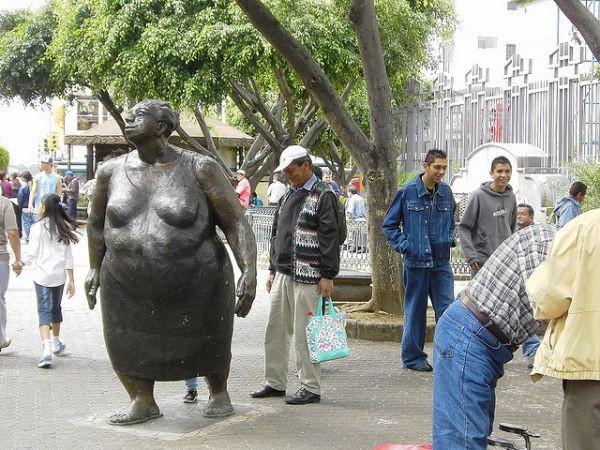Obesity Stigma: Origins and Consequences

In the area of childhood obesity, what is news? First, the reporting of current research — the hard facts about obesity — that are communicated to the public by various media. Often, that includes translating the research into something the average person can grasp. Usually this means interpretation, and sometimes it means misinterpretation, or even willful misrepresentation. For instance, research is often suspect when used by advertisers, and is particularly so when paid for by advertisers, which leads to serious conflicts of interest.
Then, there are polls that gather opinions and feelings about obesity, our own and other people’s. We reveal our weight problems, or our attitudes toward our weight problems, or the weight problems of others, and what we think should be done about both. Example: the ongoing series of Weigh2Rock polls for children and teens, where they can express their point of view with anonymous, uninhibited frankness.
Attitudes about obesity obviously have tremendous private consequences, including the stigmatization of the obese. These attitudes can have large public consequences, too, and not just on laws meant to curb obesity.
Rarely is an obese person elected to high office, especially if that person is a woman. One of the ingrained attitudes about obesity is that it’s even less acceptable in a woman than in a man. Sure, there are hefty politicians. Chances are, they were not that big when they first took office, but have been successively re-elected. The preference for slim political candidates shows that people have definite attitudes about the fitness of the fat to hold positions of power.
Obviously, in a campaign situation, overweight is taken to be a visible sign of something undesirable. Maybe deep down inside the voters are wondering, “Can someone who is unable to control their own waistline control government spending?”
Is the objection to overweight candidates instinctive or cultivated by the media? Is it justified? Bloomberg View columnist Michael Kinsley goes into the question as it applies to a certain potential presidential candidate. Kinsley’s wit is so dry, it’s sometimes hard to separate the earnest from the tongue-in-cheek, and he quotes a possible variety of attitudes:
What business is it of ours whether [he] weighs too much (and who gets to define ‘too much’)? Why should we even care, as long as we like his policies?… Being overweight establishes [his] bona fides as a populist, and as someone indifferent to the superficial trends that sweep through Cambridge or West Hollywood… There is a vast army of the overweight ready to fight for a fellow sufferer if given a chance… With a determined, disciplined effort, [he] could thin down, and he should — because the obesity epidemic is real and dangerous. And the president inevitably sets an example… Perhaps [he] is the one to help us get our national appetites under control. But it would help if he got his own under control first.
Where do attitudes come from? It just so happens that the Johns Hopkins Bloomberg School of Public Health did some research on that very question. More specifically, the researchers wanted to know how people form their perceptions about the best way to end childhood obesity. They concluded that…
… whether you believe the keys to combating childhood obesity are personal factors such as individual behavior changes or system-level factors such as marketing and the environment may depend on your primary news source. Researchers examined the news media’s framing of childhood obesity and found that television news was more likely than other news sources to focus on individual behavior change as a solution, while newspapers were more likely to identify system-level solutions.
Colleen Barry, Ph.D., M.P.P., is lead author of this study, also contributed to by colleagues from the University of Minnesota, Sarah Lawrence College, and the Yale School of Public Health. Here is a rather ominous finding:
Over the ten year study period, researchers found the mention of solutions involving restrictions on the food and beverage industry such as food and beverage taxes, vending machine restrictions and advertising regulations rose substantially in the early years of the study, but have declined sharply in recent years.
Why does this matter? The answer to that is found in an earlier research project also headed by Barry, under the auspices of Yale. It determined that…
… people who view growing rates of obesity as due primarily to bad individual choices are less likely to back a range of potential public health responses, such as changing school lunch programs, food labeling or imposing taxes on junk food. Conversely, those who see growing rates of obesity as primarily the consequence of external factors such as public manipulation by the food and beverage industry or the lack of healthy, affordable food in certain neighborhoods are more likely to back government intervention in the form of new health policies and programs.
In other words, people who pay attention to news media that present the obese as victims of forces beyond their control are more likely to look for public solutions and to be willing to spend tax dollars for those solutions. And people who pay attention to news media that emphasize personal responsibility are not. Because, to many minds, any admission that personal accountability is important translates into blaming the obese for their own condition, which is a form of stigmatization that has far-reaching political consequences, which show up as the presence or absence of help at the local level.



























